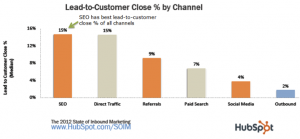4 Trends in Digital Marketing – AdLift

A solid digital marketing strategy can do wonders for your business, drawing attention to your brand, increasing audience engagement, and ultimate leading to a higher conversion and sales rate. While we don’t have to convince you that marketing is important for your business to thrive, you might be unsure about which tactics are the most effective. If you need some guidance to get started with your digital marketing plan, we’ve put together some of the most successful trends to follow.
Check out four of the top trends in Digital Marketing below!
1. Organic and Outbound
While outbound strategies are an integral part of a comprehensive marketing plan, a huge number of companies are failing to take advantage of the major opportunities that organic optimization presents. Pushing your products and services out in front of potential customers is going to garner some attention, but connecting with a relevant audience in an organic way is going to draw in more valuable leads, and lead to a higher conversion rate. If you look at the lead-to-close ratio by channel, you can see that the difference is actually quite pronounced. While SEO can produce a 15% conversion, we only see around 2% for outbound. It’s hard to argue with that sizable of a disparity.
Essentially, the customers that are ready to buy are most likely seeking out that product or service on their own, typically by searching for it. They’re much more likely to respond to the business that shows up first in their search engine results than to a business that shows up out of the blue.
2. A Greater Emphasis on Social Media Conversions
There’s no shortage of information about the important of social media in your digital marketing strategy, but marketers today are taking note of the importance of tracking conversions from social media. While the emphasis of the past was on maintaining a regularly updates and valuable social media profile, better analytics that track conversions from social media, more direct engagement, and community involvement are all coming into play in more significant ways.
Analytics:
Sometimes, figuring out the most effective social media strategy involves a little trial and error. By setting up comprehensive analytics for your social media accounts, you can track the posts that are seeing the most involvement and those that are, well, duds.
Start by adding UTM parameters to any links to your site that you include in your social media posts. In Google Analytics, you’ll be able to track which of the hits to your destination page are coming from social media, and you’ll be able to see where you’re being most effective. Use that information to help shape your upcoming posts, and fine tune from there. As trite as it may be, practice really does make perfect.
Direct Engagement:
If you’re seeing stagnancy in your follower count, it might be because you’re encountering the echo chamber dilemma. While you might be producing strong and useful content, it’s not going to gain any traction if no one is there to read it. One of the best ways to attract new followers is to engage them directly through your social media channels. Follow relevant hashtags and see what customers are looking for. When you have content that can help them, don’t hesitate to direct them to your information. It’s a win-win scenario.
Community Involvement:
One of the biggest issues that brands run into with their social media strategy is only linking to content that’s hosted on their own site. The world of social media is like any other conversation, if you want anyone to listen to what you have to say, you need to listen as well. If you want your brand to truly enter the conversation, you’re going to need to post about relevant information that comes from sources outside of your own site.
While the emphasis should remain focused on what your business can provide, you should direct your audience to helpful information around the web. Readers will have more reason to follow your accounts, and your community will have more incentive to link to your content in the future.
3. Mapping Out Your Larger Digital Plan
When it comes to digital marketing success, there is no single strategy you can implement. A successful digital marketing campaign makes use of the full range of channels available to your business. Marketers are realizing more and more that focusing their energies on one or two strategies simply isn’t going to cut it to compete anymore. A solid digital marketing plan needs to incorporate the following four elements:
– Customer Research and Competitive Analysis
– On-Page Technical Optimization
– Relevant, High-Caliber Content
– Paid Strategy for Search and Social
– Paid Strategy for Search and Social
4. The Rise of Video
Marketers and advertisers are hardly strangers to the use of promotional video, but there is an increasing number of digital marketing strategies that employ video as a key tactic to attract new customers. With the instantaneous access to YouTube and other video platforms from mobile devices, it’s an attractive (and free) channel for content distribution that your brand should absolutely leverage.
According to the 2015 Salesforce State of Marketing report:
– More than 60% of marketers report plans to substantially or at least somewhat increase spending on their video and video marketing spend.
– 56% of those questioned reported already using YouTube in their current efforts, with 68% vouching for its effectiveness.
For more information about Digital Marketing opportunities with AdLift, check out our site or give us a call at 1 (650) 409-1500! Let AdLift help you boost your digital footprint and reach a wider audience today!

